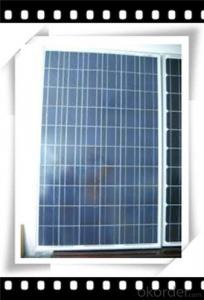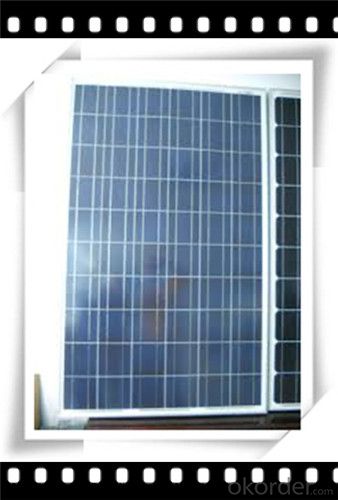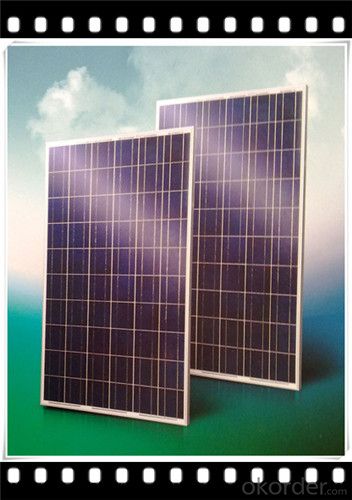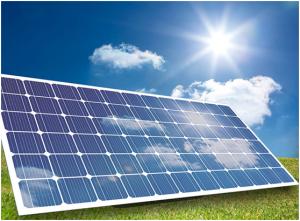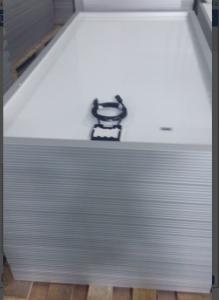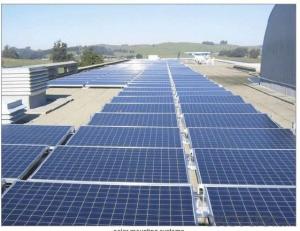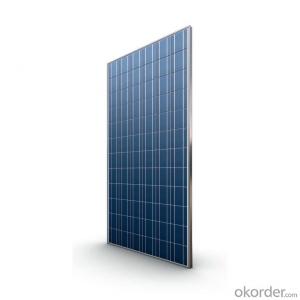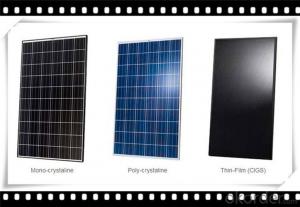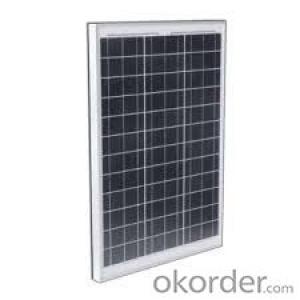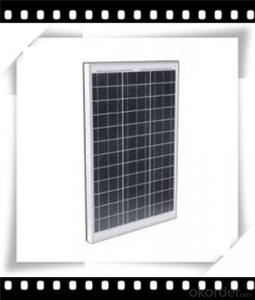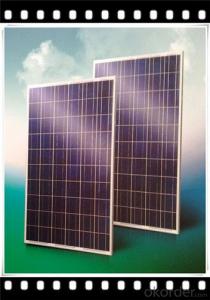Most Efficient Home Solar Panels - 80W Poly Small Solar Panel Hot Selling CNBM
- Loading Port:
- Qingdao
- Payment Terms:
- TT OR LC
- Min Order Qty:
- 10 set
- Supply Capability:
- 300000 set/month
OKorder Service Pledge
OKorder Financial Service
You Might Also Like
Polycrystalline Solar Modules
CNBM offers a range of small, medium and large polycrystalline solar modules, designed for a range of requirements.
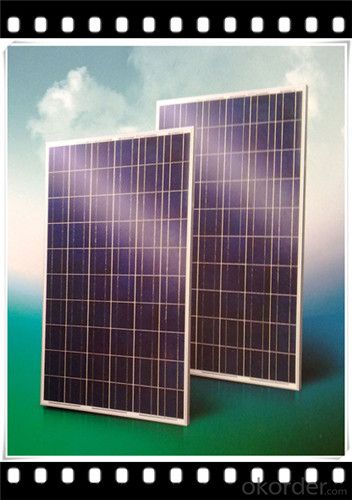
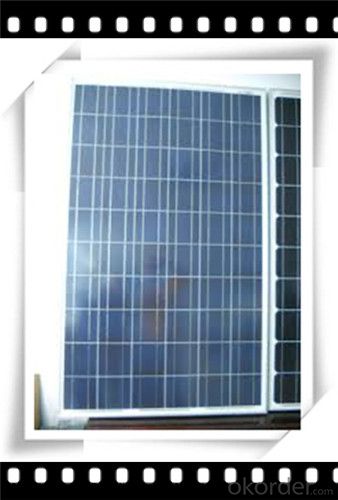
Specifications:
+/-3% |
Polycrystalline silicon solar cells (156 x 156mm) |
60 (10 x 6) |
1650 x 990 x 40 |
25.5 |
Limits:
Operating Temperature | -40~+85? |
Storage Temperature | -40~+85? |
Maximum System Voltage | 1000 VDC max. |
Hail Impact | Diameter of 28mm with impact speed |
Temperature and Coefficients:
NOCT | 48C+/-2? |
Voltage temperature coefficient (%/K) | -0.35 |
Current temperature coefficient (%/K) | 0.05 |
Power temperature coefficient (%/K) | -0.45 |
Characteristics:
Model: | SGM-200P | SGM-210P | SGM-220P |
Max-power voltage Vmp (V) | 29.2 | 29.4 | 29.41 |
Max-power current Imp (A) | 6.85 | 7.14 | 7.48 |
Open-circuit voltage Voc (V) | 36.5 | 36.69 | 36.9 |
Short-Circuit Current Isc (A) | 7.28 | 7.6 | 7.93 |
Max-power Pm(W) | 200 | 210 | 220 |
Model: | SGM-230P |
Max-power voltage Vmp (V) | 29.8 |
Max-power current Imp (A) | 7.72 |
Open-circuit voltage Voc (V) | 37.31 |
Short-Circuit Current Isc (A) | 8.19 |
Max-power Pm(W) | 230 |
STC: Irradiance 1000W/m2, module temperature 25?, AM-=1.5
Poly Crystalline Solar Panels Specifications Range
Maximum Power (Pm) | Dimension | Weight | Operating Voltage (Vmp) | Operating Current (Imp) | Open Circuit Voltage (Voc) | Short Circuit Current (Isc) |
0.45W | 140x80x10mm | 0.08kg | 3.3V | 150mA | 4.6V | 160mA |
1.0W | 162x140x10mm | 0.16kg | 7.5V | 150mA | 10.3V | 160mA |
4.5W | 269x251x23mm | 0.8kg | 16.5V | 0.27A | 20.5V | 0.3A |
10W | 420.1×268.9×22.6mm | 1.92kg | 17.5V | 0.58A | 20.5V | 0.6A |
20W | 425x502x50mm | 3.0kg | 16.8V | 1.19A | 21.0V | 1.29A |
30W | 593x502x22.6mm | 3.9kg | 16.8V | 1.78A | 21.0V | 1.94A |
40W | 655x537x50mm | 5.75kg | 17.3V | 2.31A | 22.1V | 2.54A |
50W | 839x537x50mm | 6.0kg | 17.5V | 2.9A | 21.8V | 3.17A |
65W | 1111x502x50mm | 7.2kg | 17.6V | 3.69A | 22.1V | 3.99A |
80W | 1204x537x50mm | 7.7kg | 17.6V | 4.55A | 22.1V | 4.8A |
- Q: How much money can you save by using solar panels?
- The amount of money you can save by using solar panels depends on various factors such as your energy consumption, the size of your solar panel system, and the cost of electricity in your area. On average, homeowners can save anywhere from 40% to 70% on their electricity bills by switching to solar panels. However, it's important to consult with a solar energy professional to get an accurate estimate based on your specific circumstances.
- Q: What is the average cost of solar panel installation?
- The average cost of solar panel installation varies depending on several factors such as the size of the system, location, and specific requirements. However, as of 2021, the average cost can range from $11,000 to $20,000 for a residential installation. It's important to note that there may be additional costs involved, such as permits, maintenance, and potential upgrades.
- Q: I've built a set of lights, fan and a clock running on only solar power. The problem is, i have to present it tomorrow and when the light isn't particularly strong it won't work too well. It works flawlessly when its under my desk light on max brightness but the only the light works when i set it to low brightness. Currently, tomorrow in my city it won't be sunny so any advice for trying to make it work under low light?
- Solar panels are designed to be used to recharge a battery or series of batteries, not for direct power. That is the inherent weakness of solar systems. The only way to have it work in low light conditions if to have several cells wired in series and have a voltage regulator to limit the amount of voltage that can be supplied. Other than that, add a battery and a charging circuit that the cell would supply power to.
- Q: my pool guy cleaned the filter and replaced the DE, but now my roof solar panels have started leaking. how do i stop the leak? does backwashing help in any way?
- bypass the whole panel if you can ( one individual panel of several ) , or bypass that loop in that panel - car part rubber hose clamps
- Q: Can solar panels be used in areas with high levels of drought?
- Yes, solar panels can be used in areas with high levels of drought. Solar panels do not require water to generate electricity, so they can still function effectively in dry conditions. In fact, the high levels of sunshine often associated with drought-prone areas can actually make solar panels more efficient.
- Q: I was trying to look online for solar panels for my home to take some of the strain off of using oil and electricity but I find it very hard to understand exactly how they are used.Like one that I looked up is 00 watts.....is that like a light bulb watt? How many things can that power? Is it really cheaper in the long run because the panels are very expensive?If anyone has web sites that can explain this to me I would appreciate a link, or anyone to answer part of my question.
- Solar panels produce low voltage direct current electricity. To be used in a home that electricity must be stored in batteries and converted to 20-240 volts 60 hertz AC (alternating current). And its frequency must be synchronized to the electricity supplied by the power company. A 00 watt solar panel produces 00 watts of power, enough to power one 00 watt light bulb. To generate enough power to power a home, the solar panel must be capable of producing at least 500 to 2000 watts per hour (.5/2.0 KW/hrs) And you're quite correct, it's an expensive proposition to install a solar panel system... and it should be installed by experts.
- Q: Can solar panels be installed on historical buildings?
- Yes, solar panels can be installed on historical buildings. However, it requires careful planning and consideration to ensure that the installation does not compromise the building's historical integrity. Various techniques can be employed, such as integrating solar panels into existing structures, using non-penetrating mounting systems, or placing panels in less visible areas. Preservation guidelines and local regulations should be followed to maintain the historical significance while promoting sustainable energy.
- Q: Could you throw some long scientific words in with your answer so I can impress my teacher, I'm looking to expand my scientific vocab. Thanks
- Actually Photovoltaic cells also called solar cells in collection forms solar panel. Photovoltaic cells consist of silicon for converting solar energy into electrical energy.
- Q: Can solar panels be installed on military bases or installations?
- Yes, solar panels can be installed on military bases or installations. In fact, many military bases around the world have already adopted solar energy as a means of reducing their reliance on traditional fossil fuels and increasing their energy security. Solar panels provide a sustainable and cost-effective source of electricity, which aligns with the military's efforts to improve environmental sustainability and operational efficiency. Additionally, solar installations on military bases can enhance energy resilience and readiness by reducing vulnerability to power outages and disruptions.
Send your message to us
Most Efficient Home Solar Panels - 80W Poly Small Solar Panel Hot Selling CNBM
- Loading Port:
- Qingdao
- Payment Terms:
- TT OR LC
- Min Order Qty:
- 10 set
- Supply Capability:
- 300000 set/month
OKorder Service Pledge
OKorder Financial Service
Similar products
Hot products
Hot Searches
Related keywords
